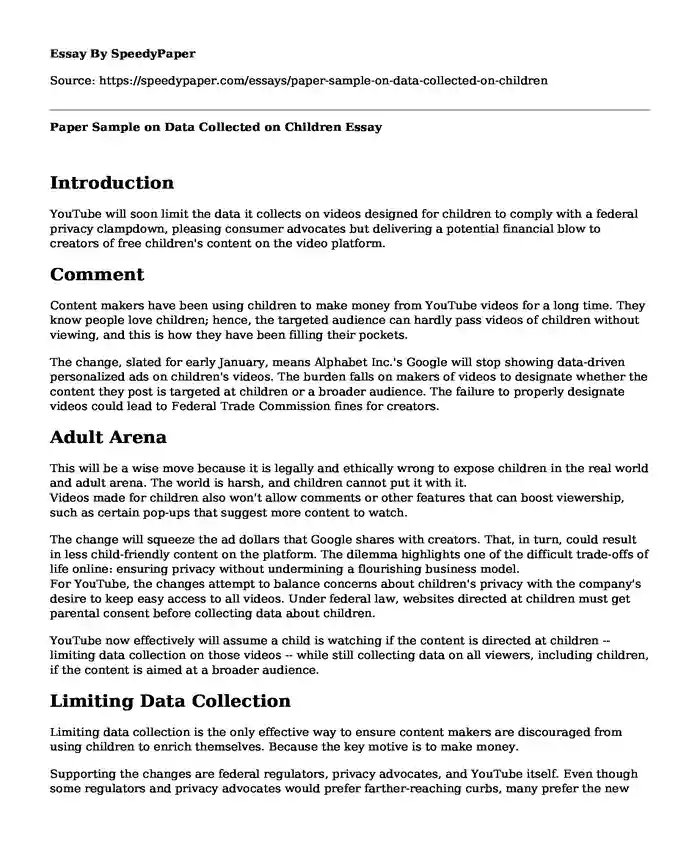
| Type of paper: | Essay |
| Categories: | YouTube Law Internet Government Childhood |
| Pages: | 3 |
| Wordcount: | 668 words |
Introduction
YouTube will soon limit the data it collects on videos designed for children to comply with a federal privacy clampdown, pleasing consumer advocates but delivering a potential financial blow to creators of free children's content on the video platform.
Comment
Content makers have been using children to make money from YouTube videos for a long time. They know people love children; hence, the targeted audience can hardly pass videos of children without viewing, and this is how they have been filling their pockets.
The change, slated for early January, means Alphabet Inc.'s Google will stop showing data-driven personalized ads on children's videos. The burden falls on makers of videos to designate whether the content they post is targeted at children or a broader audience. The failure to properly designate videos could lead to Federal Trade Commission fines for creators.
Adult Arena
This will be a wise move because it is legally and ethically wrong to expose children in the real world and adult arena. The world is harsh, and children cannot put it with it.
Videos made for children also won't allow comments or other features that can boost viewership, such as certain pop-ups that suggest more content to watch.
The change will squeeze the ad dollars that Google shares with creators. That, in turn, could result in less child-friendly content on the platform. The dilemma highlights one of the difficult trade-offs of life online: ensuring privacy without undermining a flourishing business model.
For YouTube, the changes attempt to balance concerns about children's privacy with the company's desire to keep easy access to all videos. Under federal law, websites directed at children must get parental consent before collecting data about children.
YouTube now effectively will assume a child is watching if the content is directed at children -- limiting data collection on those videos -- while still collecting data on all viewers, including children, if the content is aimed at a broader audience.
Limiting Data Collection
Limiting data collection is the only effective way to ensure content makers are discouraged from using children to enrich themselves. Because the key motive is to make money.
Supporting the changes are federal regulators, privacy advocates, and YouTube itself. Even though some regulators and privacy advocates would prefer farther-reaching curbs, many prefer the new system to the old one. Children watched YouTube in droves, and the platform treated them no differently. The change is YouTube's response to FTC allegations the platform has been tracking children' online activities in violation of the 1998 Children's Online Privacy Protection Act.
The new system creates balance by ensuring children access their level content, and at the same time, it curbs content creators from making money using children. It kills two bird with one stone.
The FTC's allegations stemmed, in part, from the company's compilation of "identifiers" that follow viewers online, building a profile for advertising. If someone watches a toy video on YouTube, toymakers can chase them with ads across the web. The FTC has said these identifiers constitute personal data under COPPA and that YouTube was using them to track viewers of child-directed content.
YouTube has never admitted wrongdoing, but in September, it paid a $170 million fine to settle the allegations and agreed to create a system to flag child-designated videos.
Conclusion
YouTube doesn't break down its audience by age, but the platform says more than two billion users visit a month. Popular child-video creators can make millions of dollars a year in sponsorships and other revenue, but most fall short of making YouTube their primary job. YouTube pays creators based on how many views -- and ads -- videos generate
Children's videos will still have contextual ads, based on a post's content or other data. Still, YouTube has told creators to expect less revenue without targeted ads based on personal data.
Works Cited
Ryan, Tracy. "YouTube Curbs Data Collected on Children." Wall Street Journal, Dec 31, 2019. ProQuest,
https://www-proquestcom.delmar.idm.oclc.org/docview/2331383404?accountid=7025.
Merriam-webster. Online dictionary. 1828. Website. https://www.merriam-webster.com/.
Cite this page
Paper Sample on Data Collected on Children. (2024, Jan 01). Retrieved from https://speedypaper.com/essays/paper-sample-on-data-collected-on-children
Request Removal
If you are the original author of this essay and no longer wish to have it published on the SpeedyPaper website, please click below to request its removal:
- Essay Example on Presentation Skills on YouTube
- Apollo 13 - The Movie Essay Sample
- Essay Sample Describing Evolution of Democracy in The United States
- Essay Sample on The Star Movie Analysis
- Essay Sample on Fascinating and Inspiring Aspects of Artificial Intelligence
- Essay Sample on Types of Espionage
- Cultural Critiques in Human Beings - Free Essay Example
Popular categories




